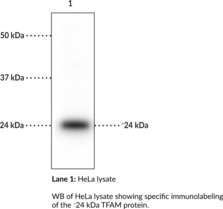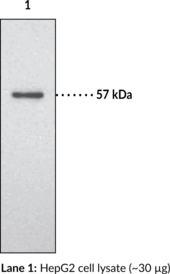Description
Mitochondrial transcription factor A (TFAM) is a mitochondrial DNA (mtDNA) binding protein that maintains the mitochondrial genome by regulating replication, transcription, and packaging of mtDNA.{59160} It contains two high mobility group (HMG) box domains that bind mtDNA and induce a conformational change that permits binding of mitochondrial RNA polymerase (mtRNAP) to the promoter start site. TFAM binds to mtRNAP, recruiting mitochondrial transcription factor 2 (TFB2M) and initiating transcription. TFAM also maintains mitochondrial genome stability by non-specifically binding to mtDNA, packaging it into nucleoid-like structures. Homozygous knockout of Tfam in mice is embryonic lethal whereas heterozygous Tfam knockdown mice are viable but have reduced mtDNA copy numbers and decreased activity of the mitochondrial respiratory chain complexes I, III, IV, and V in the heart.{59161} Genetic overexpression of Tfam reduces age-induced accumulation of lipid peroxidation products in the brain and memory impairments in mice.{59162} Increased tumor TFAM protein levels are associated with increased tumor size in patients with breast cancer.{59163} SNPs in TFAM have been identified in patients with a variety of neurodegenerative disorders, including Parkinson’s disease, Alzheimer’s disease, and Huntington’s disease.{59160} Cayman’s TFAM Polyclonal Antibody can be used for Western blot (WB) applications. The antibody recognizes TFAM at approximately 24 kDa from human samples.
Synonyms: Mitochondrial Transcription Factor 1|Transcription Factor A, Mitochondrial
Immunogen: Native recombinant human TFAM protein with a C-terminal 6-His tag
Formulation: 100 µl of polyclonal antibody
Isotype:
Applications: WB
Origin:
Stability: 365 days
Application|Western Blot||Product Type|Antibodies|Polyclonal Antibodies||Research Area|Cancer|Transcription Factors||Research Area|Cardiovascular System|Cardiovascular Diseases||Research Area|Cell Biology|Mitochondrial Biology||Research Area|Epigenetics, Transcription, & Translation|RNA, DNA, & Protein Synthesis||Research Area|Epigenetics, Transcription, & Translation|Transcription Factors||Research Area|Neuroscience|Behavioral Neuroscience|Learning & Memory||Research Area|Neuroscience|Neurodegenerative Disorders|Alzheimer’s Disease||Research Area|Neuroscience|Neurodegenerative Disorders|Huntington’s Disease||Research Area|Neuroscience|Neurodegenerative Disorders|Parkinson’s Disease||Research Area|Oxidative Stress & Reactive Species|Lipid Peroxidation




